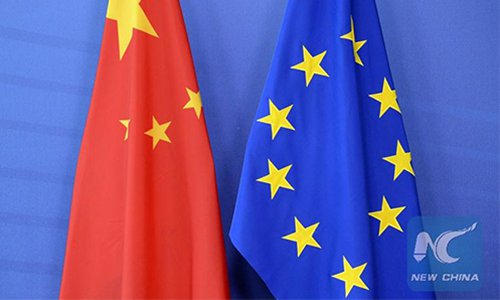HOME >> BUSINESS
US obsession of trade war brings Beijing, EU closer
By Wang Jiamei Source:Global Times Published: 2019/10/22 21:49:10

China Europe Photo:Xinhua
Momentum has grown for strengthened cooperation between China and the EU as the US-China trade war continues.
Chinese State Councilor and Foreign Minister Wang Yi said on Monday in Paris that China and France will sign 30 to 40 contracts during French President Emmanuel Macron's visit in November, according to an AFP report. Since France is the bellwether for Europe, the deepening of Sino-French economic and trade cooperation undoubtedly bodes well for the development of China-EU economic and trade relations.
Wang also expressed confidence over the conclusion of a China-EU bilateral investment treaty (BIT). Talks on the BIT, which covers market access, negative lists and competitive neutrality, began in 2014. A high-level agreement is expected to be signed in 2020.
With the world economy hit by a turbulent mix of policy uncertainty and turmoil, China and the EU need such an agreement more than ever. The US-China trade war has brought headwinds to the development of China-EU economic and trade relations. Generally speaking, trade shifts caused by the US-China friction can hardly benefit the EU economy. Moreover, considering the trade conflict's disruption of global value chains, the EU economy is likely to suffer more in the future.
However, looking on the bright side, both sides have realized that they need to resolve their trade and investment issues in a coordinated way instead of arbitrarily bullying others like the US. In this sense, the trade war has actually accelerated the momentum for closer ties between China and the EU.
There is a basis for cooperation and mutual benefit between China and the EU. According to statistics from the Ministry of Commerce, bilateral trade between China and the EU hit a record high of $682.2 billion in 2018, up 10.6 percent year-on-year. The EU is now China's largest trading partner, and China has become the EU's second-largest trading partner.
That doesn't mean that China-EU trade relations are problem-free, but arbitrarily starting a trade war cannot solve any problem. The "extreme pressure" methods pursued by the US have ended up seeing the blowback of similar retaliatory measures from China.
By comparison, the EU appears willing to address trade friction under multilateral mechanisms, and China will certainly sit down with those who are amenable to reason. Just like Wang said, "the best way is to reach an agreement that fully takes into account the needs of both parties, rather than imposing your own requirements on the other party."
Finally, it should be pointed out that China is still a developing country and has been working hard all along to accelerate and improve its market opening-up.
For example, consider China's new foreign investment law. The law, which is set to take effect next year, "is surprisingly accommodating to all concerns ... we have," Joerg Wuttke, president of the EU Chamber of Commerce in China, was quoted by a recent CNBC report as saying.
The author is a reporter with the Global Times. bizopinion@globaltimes.com.cn
Posted in: EYE ON ECONOMY